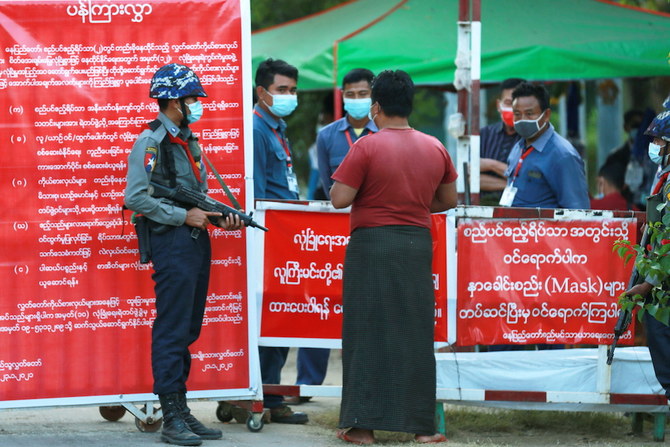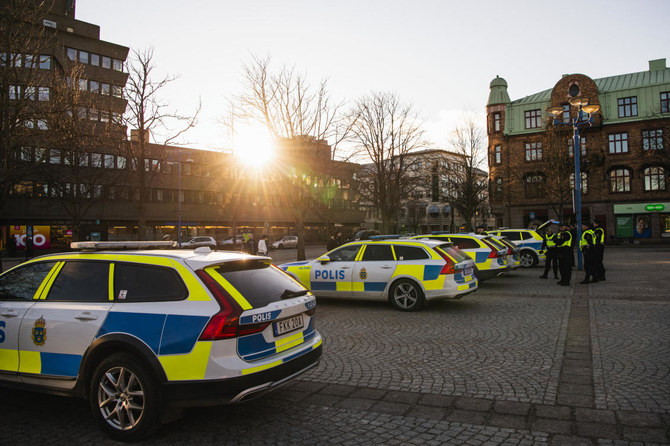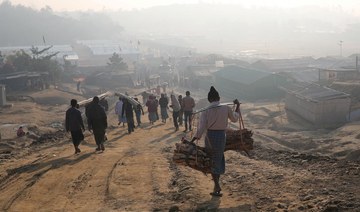WASHINGTON/UNITED NATIONS: The US State Department will conduct a review of its foreign assistance to Myanmar after determining that the military takeover in the Asian country this week constituted a coup, senior officials said on Tuesday.
US President Joe Biden has threatened new sanctions against the generals who seized power in Myanmar and detained elected leaders including Nobel laureate Aung San Suu Kyi early on Monday.
In a briefing with reporters, State Department officials said Washington has not been in direct contact with the coup leaders in Myanmar or the deposed civilian government leaders.
Under US law, the assessment that a coup has taken place automatically puts restrictions on US assistance, but officials said humanitarian aid, including to the stateless Rohingya Muslim minority in Myanmar, and programs that promote democracy or benefit civil society would continue.
“In addition, we will take a broader review of our assistance programs to ensure they align with recent events,” a State Department official said.
US officials would also conduct a review of sanctions against Myanmar’s military leaders and companies associated with them, the official said.
State Department officials briefed staff from the US House of Representatives Foreign Affairs Committee and Senate Foreign Relations Committee on Monday about the situation but did not preview new sanctions, according to aides who were on the call.
US officials were trying to work with European and Asian allies who have contacts with Myanmar’s military, but had not made much progress, lawmakers were told, according to an aide.
Senate Republican Leader Mitch McConnell, who has close ties to Suu Kyi, said in a statement he had spoken to Biden and Secretary of State Antony Blinken on Monday about the situation in Myanmar and urged the administration to “impose significant costs on the military for its attack on democracy.”
Meanwhile, the UN envoy for Myanmar urged an emergency meeting of the Security Council on Tuesday to ensure that “democracy is expeditiously restored” to the Southeast Asian nation, but the United Nations’ most powerful body took no immediate action.
Christine Schraner Burgener, the Myanmar ambassador who is currently in Europe, strongly condemned the military’s takeover of the government and said the council must “collectively send a clear signal in support of democracy in Myanmar” and ensure the country “doesn’t fall back into isolation.”
Diplomats said restoring democracy was the key element of a draft statement prepared for the council to release to the media after the closed-door meeting, along with a condemnation of the military’s action and call for the immediate release of all those detained.
But the statement was not issued because it requires support from all 15 council members and the UN missions for China and Russia said they needed to send it to their capitals for review, the diplomats said, speaking on condition of anonymity because the meeting was closed. China has close ties to Myanmar.
Schraner Burgener told the council that the Myanmar military’s declaration of a state of emergency and detention of top leaders including Aung San Suu Kyi and dozens of lawmakers and civilian officials just as the new parliamentary session was about to open Monday “was surprising and shocking.”
The military said the seizure of power was necessary because the government had not acted on the military’s unsubstantiated claims of fraud in November’s election in which Suu Kyi’s party won a majority of seats.
Britain’s UN ambassador, Barbara Woodward, the current council president, told reporters after the meeting that ambassadors echoed widespread international concerns about the military’s action at the virtual session.
“And we welcome the role of regional partners ... to resolve this crisis,” including the Association of Southeast Asian Nations, she said.
Brunei, which chairs the 10-nation regional ASEAN group, including Myanmar, issued a statement Monday noting the bloc’s principles include “the adherence to the principles of democracy, the rule of law and good governance, respect for and protection of human rights and fundamental freedoms.”
The statement encouraged “the pursuance of dialogue, reconciliation and the return to normalcy in accordance with the will and interests of the people of Myanmar.”
But it made no mention of any action by ASEAN to take the lead in returning Myanmar to a democratic path.
At the United Nations, Woodward said: “Discussions will continue among council colleagues on next steps. I certainly hope that we will be able to speak with one voice.”
China’s Foreign Ministry spokesman, Wang Wenbin, called Myanmar “a friendly neighbor” Tuesday and expressed hope that all parties “will properly handle their differences under the constitutional and legal framework and maintain political and social stability.”
“Whatever actions taken by the international community shall contribute to Myanmar’s political and social stability, promote its peace and reconciliation, and avoid escalating the conflict and complicating the situation,” Wang said in Beijing.
Myanmar has been a very difficult issue for the Security Council to take any action, but not impossible.
In November 2017, the council adopted a presidential statement condemning widespread violence in northern Rakhine State and expressing grave concern at reported human rights violations by Myanmar’s security forces against minority Rohingya Muslims. It called on the government to ensure “no further excessive use of military force,” which led 700,000 Rohingya to flee to neighboring Bangladesh.
Before Tuesday’s council meeting, the UN’s director for the group Human Rights Watch, Louis Charbonneau, said the council’s “abysmal failure to address Myanmar’s past appalling human rights abuses assured the military they could do as they please without serious consequences.”
He called on the council to demand the immediate release of all detained political leaders and activists and the restoration of civilian democratic rule. He said sanctions should be imposed “on those military leaders responsible.”
Amnesty International’s deputy director of advocacy, Sherine Tadros, urged the council to freeze the assets of Senior Gen. Min Aung Hlaing, now in charge of the government, and other military leaders responsible for crimes against ethnic minorities, including the Rohingya.
“The Security Council must also impose a comprehensive global arms embargo on Myanmar, and crucially, refer the situation in Myanmar to the International Criminal Court,” she said.
US President Joe Biden’s administration on Tuesday called the Myanmar military’s action a coup, setting the stage for sanctions and other measures targeting what State Department officials said was “the very small circle of military generals” responsible.
While the US and other Western nations may impose sanctions on Myanmar, Security Council approval of targeted measures is highly unlikely. That would take a resolution, which China would likely veto.
Getting approval for a press statement remains a possibility, but not a certainty.
Sven Jürgenson, the UN ambassador for council member Estonia, supported the proposed statement, strongly condemning the coup and urging Myanmar’s military to respect the 2008 constitution, allow Parliament to do its work, and “recommit to the peace process.”
(With Reuters and AP)
US calls military acts in Myanmar a coup, UN Security Council takes no action
https://arab.news/r937q
US calls military acts in Myanmar a coup, UN Security Council takes no action

- Biden has threatened new sanctions against the generals who seized power in Myanmar
- UN envoy urges Security Council to ‘send clear signal’ to support Myanmar democracy
Belgium’s Ghent university severs ties with three Israeli institutions

Pro-Palestinian protesters in Ghent have been protesting against Israel’s military offensive in Gaza and have been occupying parts of the university since early this month.
The university’s rector, Rik Van de Walle, said in a statement that ties were being cut with Holon Institute of Technology, MIGAL Galilee Research Institute, and the Volcani Center, which carries out agricultural research.
“We currently assess these three partners as (very) problematic according to the Ghent University human rights test, in contrast to the positive evaluation we gave these partners at the start of our collaboration,” Van de Walle said.
Partnerships with MIGAL Galilee Research Institute and the Volcani Center “were no longer desirable” due to their affiliation with Israeli ministries, an investigation by the University of Ghent found, and collaboration with the Holon Institute “was problematic” because it provided material support to the army for actions in Gaza.
A spokesperson for the university said the move would affect four projects.
The three Israeli institutions did not immediately comment.
The protesters told Belgian broadcaster VRT they welcomed the decision but regarded it as only a first step. They said they would continue their occupation of parts of the university “until UGent breaks its ties with all Israeli institutions.”
The actions mirror those of students in the United States and elsewhere in Europe, calling for an immediate permanent ceasefire and for schools to cut financial ties with companies they say are profiting from what they regard as the oppression of Palestinians.
Muslim professionals quit ‘hostile’ France in silent brain drain

PARIS: After being knocked back at some 50 interviews for consulting jobs in France despite his ample qualifications, Muslim business school graduate Adam packed his bags and moved to a new life in Dubai.
“I feel much better here than in France,” the 32-year-old of North African descent told AFP.
“We’re all equal. You can have a boss who’s Indian, Arab or a French person,” he said.
“My religion is more accepted.”
Highly-qualified French citizens from Muslim backgrounds, often the children of immigrants, are leaving France in a quiet brain drain, seeking a new start abroad in cities like London, New York, Montreal or Dubai, according to a new study.
The authors of “France, you love it but you leave it”, published last month, said it was difficult to estimate exactly how many.
But they found that 71 percent of more than 1,000 people who responded to their survey circulated online had left in part because of racism and discrimination.
Adam, who asked that his surname not be used, told AFP his new job in the United Arab Emirates has given him fresh perspective.
In France “you need to work twice as hard when you come from certain minorities”, he said.
He said he was “extremely grateful” for his French education and missed his friends, family and the rich cultural life of the country where he grew up.
But he said he was glad to have quit its “Islamophobia” and “systemic racism” that meant he was stopped by police for no reason.
France has long been a country of immigration, including from its former colonies in North and West Africa.
But today the descendants of Muslim immigrants who came to France seeking a better future say they have been living in an increasingly hostile environment, especially after the attacks in Paris in 2015 that killed 130 people.
They say France’s particular form of secularism, which bans all religious symbols in public schools including headscarves and long robes, seems to disproportionately focus on the attire of Muslim women.
Another French Muslim, a 33-year-old tech employee of Moroccan descent, told AFP he and his pregnant wife were planning to emigrate to “a more peaceful society” in southeast Asia.
He said he would miss France’s “sublime” cuisine and the queues outside the bakeries.
But “we’re suffocating in France”, said the business school graduate with a five-figure monthly salary.
He described wanting to leave “this ambient gloom”, in which television news channels seem to target all Muslims as scapegoats.
The tech employee, who moved to Paris after growing up in its lower-income suburbs, said he has been living in the same block of flats for two years.
“But still they ask me what I’m doing inside my building,” he said.
“It’s so humiliating.”
“This constant humiliation is even more frustrating as I contribute very honestly to this society as someone with a high income who pays a lot of taxes,” he added.
A 1978 French law bans collecting data on a person’s race, ethnicity or religion, which makes it difficult to have broad statistics on discrimination.
But a young person “perceived as black or Arab” is 20 times more likely to face an identity check than the rest of the population, France’s rights ombudsman found in 2017.
The Observatory for Inequalities says that racism is on the decline in France, with 60 percent of French people declaring they are “not at all racist”.
But still, it adds, a job candidate with a French name has a 50 percent better chance of being called by an employer than one with a North African one.
A third professional, a 30-year-old Franco-Algerian with two masters degrees from top schools, told AFP he was leaving in June for a job in Dubai because France had become “complicated”.
The investment banker, the son of an Algerian cleaner who grew up within Paris, said he enjoyed his job, but he was starting to feel he had hit a “glass ceiling”
He also said he had felt French politics shift to the right in recent years.
“The atmosphere in France has really deteriorated,” he said, alluding to some pundits equating all people of his background to extremists or troublemakers from housing estates.
“Muslims are clearly second-class citizens,” he said.
Adam, the consultant, said more privileged French Muslims emigrating was just the “tiny visible part of the iceberg”.
“When we see France today, we’re broken,” he said.
North Korea fires ballistic missile, South Korea’s military says

- South Korea’s Joint Chiefs of Staff did not immediately provide details of the projectile or its trajectory
- North Korea has launched a range of ballistic and cruise missiles as well as tactical rockets in recent months
SEOUL: North Korea fired a ballistic missile toward the sea off its east coast, South Korea’s military said on Friday.
South Korea’s Joint Chiefs of Staff did not immediately provide details of the projectile or its trajectory.
North Korea has launched a range of ballistic and cruise missiles as well as tactical rockets in recent months, describing them as part of a program to upgrade its defensive capabilities.
Earlier on Friday, the powerful sister of North Korea leader Kim Jong Un said its tactical rockets were intended solely as a deterrent against South Korean military aggression, while denying that Pyongyang was exporting the weapons.
The missile launch comes at the same time as a visit by Russian President Vladimir Putin to the Chinese northeastern city of Harbin.
French police ‘neutralized’ armed person who tried to set fire to synagogue in Rouen — Darmanin

- The incident occurred early on Friday morning
PARIS: French police in Rouen shot dead an armed man who set fire to the city’s synagogue, Interior Minister Gerald Darmanin and local officials said on Friday.
The incident occurred in central Rouen, 130 kilometers northwest of Paris, early on Friday morning, Darmanin said in a post on social network X.
The attacker’s identity and motive were still unclear. He was carrying a knife and iron bar, according to local authorities.
France hosts the Olympic Summer Games in two months and recently raised its alert status to the highest level against a complex geopolitical backdrop in the Middle East and Europe’s eastern flank.
Elie Korchia, the president of France’s Consistoire Central Jewish worshippers body, said police had “avoided another anti-Semitic tragedy.”
Regional broadcaster France 3 said fire fighters were on the site. The fire had been brought under control, a Rouen city hall official said.
Rouen’s mayor said the Normandy town was ‘battered and shocked’.
The city in 2016 was rocked by an attack later claimed by the Islamic State, when a priest was killed with a knife during service in town of Saint-Étienne-du-Rouvray, in the southern part of Rouen’s urban agglomeration.
Suspected gunshots near Israeli embassy in Stockholm prompt police cordon

STOCKHOLM: Swedish police have detained several people and cordoned off an area in Stockholm after a patrol heard suspected gunshots, they said on Friday, with the Israeli embassy located in the closed-off area.
"A police patrol at Strandvagen in Stockholm heard bangs and suspected there had been a shooting," police said on their website, adding that the affected area lay between the capital's Djurgarden Bridge, its Nobel Park and the Oscar Church.
Several people have been detained and an investigation has been launched into a suspected serious weapons crime, they added.
"In connection with the ongoing forensic investigation, findings have been made that strengthen the suspicions that a shooting took place," police said on its website.
Reuters could not immediately reach police and the Israeli embassy for comment.
Swedish news agency TT said police declined to comment on whether there was a link between the incident and the Israeli embassy.




















